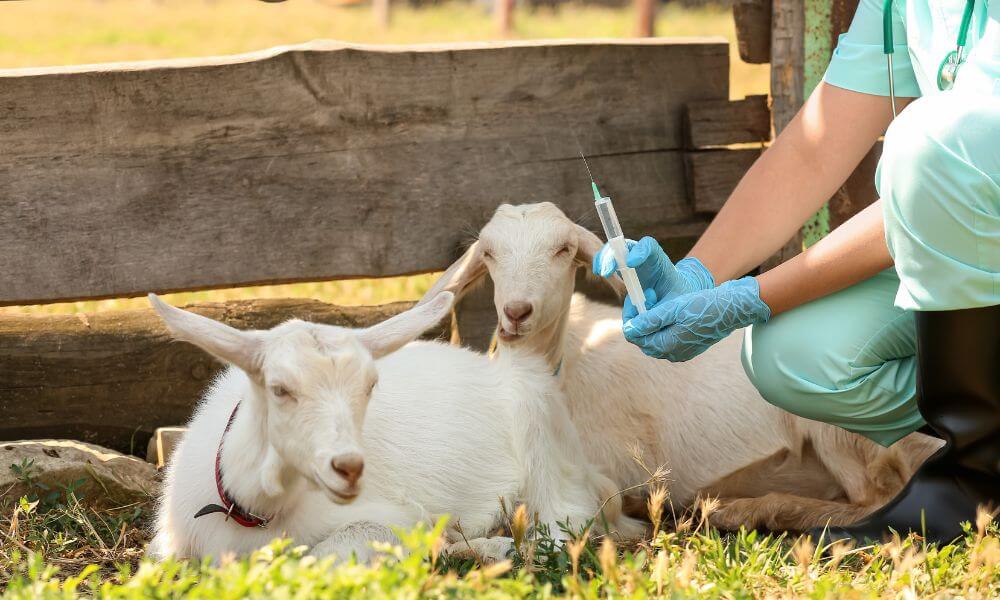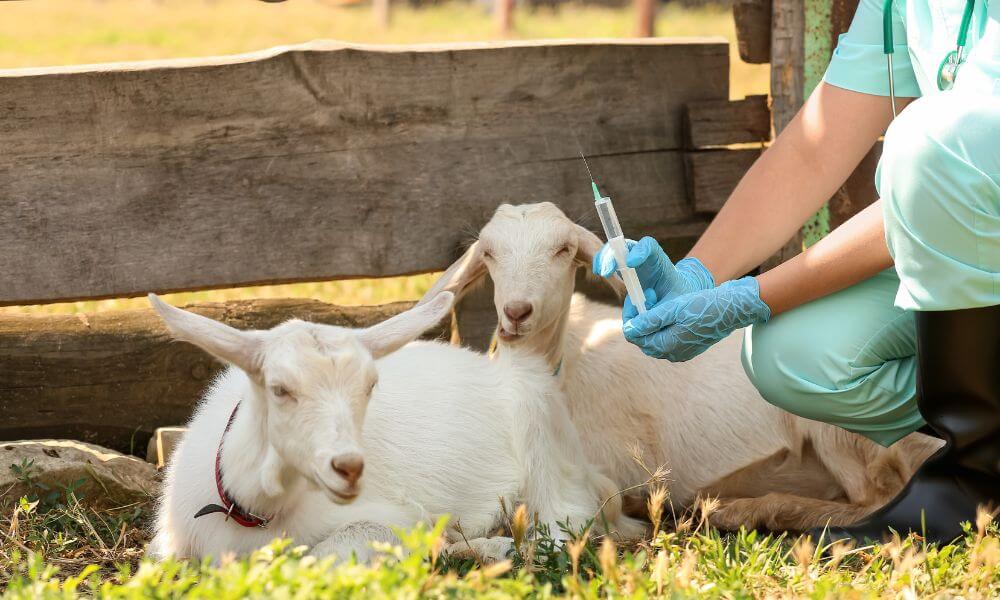Broadly speaking, goats need what is called a CDT vaccine—this prevents perfingens, type C and D, and tetanus.
There are a number of options commercially available depending on where you are.
Let’s look further into this.

Should I vaccinate my goats?
Yes, you absolutely should vaccinate your goats.
They don’t need a great many vaccinations, generally speaking, but the ones they do need are really important.
Virtually anywhere you are, goats are at potential risk of CDT diseases of one form or another—I’ll get into exactly what these are shortly.
If you don’t vaccinate your goats, though, they are at huge risk of bacterial infections from things present in the soil, in feces, and even in dust that settles on the goat’s skin.
While there are other treatments for such diseases, like antitoxins, they are designed to be used after the goat is infected.
It’s much better to prevent the possibility of it ever occurring by vaccinating them at a very early age.
In cases of tetanus, it’s very uncommon for goats to recover, and they can very often die within a few short hours of infection.
In virtually all commercial goat farms, goats are vaccinated against these problem bacteria.
Generally speaking, it’s a good rule of thumb that it is in the goat’s best interests to do something if it is done by those whose goats represent their livelihood.
Now, let’s look at the most important vaccines to give to your goats.
What are the two most common vaccines given to goats?
Let’s make a distinction here. As I’ve mentioned, there are many vaccines today which protect your goat against multiple diseases and infections.
That said, there are two main conditions and bacterial infections which are typically vaccinated against, falling under the umbrella of CDT.
The first is clostridium, types C and D. Clostridium is a type of bacteria that can cause diarrhea.
As I mentioned, it is found in soil and feces and can travel into open wounds and potentially be ingested while your goat is grazing or foraging.
Enterotoxaemia is also caused by these bacteria and is a very severe disease often resulting in death.
The other important condition that goats are usually vaccinated against is tetanus—the T of CDT.
This is also caused by the same genus of bacteria, though Clostridium tetani rather than types C or D.
As I mentioned, this is almost always fatal when unvaccinated goats catch it.
So, whatever amount of vaccines it actually entails, goats are vaccinated against clostridium bacteria.
CDT vaccines are very common, and Lambivac is one of the most common to protect against these problems.
Vaccination is an ongoing process, though—it isn’t just a one-and-done situation, just as is the case with human vaccinations.
So let’s look at how often they need to be administered.
How often do you give a goat a CDT shot?
It starts at a very young age, although some would suggest that it depends on the immunization status of the mother.
If she was vaccinated properly against CDT infections, then the kid will likely have a better chance, and you can vaccinate a bit later.
Ideally, you should vaccinate the mother during the pregnancy before the kid is born.
Two shots should be given, one six weeks and one three weeks prior to kidding.
This will maximize antibody protection.
For kids from an unvaccinated mother, you should vaccinate a baby when it is between one and three weeks old.
Thereafter, you’ll administer two booster shots at four-week intervals.
For properly vaccinated does, 8-12 weeks for the CDT shot should do just fine.
Ideally, from then on, you should give your goats a CDT vaccine every six months.
This booster will maintain antibody protection, as the vaccines unfortunately do not last forever.
Let’s look at the nuts and bolts of actually doing it, then.
How do you administer shots to goats?
If you’ve never administered a shot before, then it’s really a good idea to speak to someone who has, first.
Whether it’s a vet or an experienced goat owner who has vaccinated their goats in the past, you should have someone show you first.
Once you have seen it done and done it yourself a few times, it does become simpler and easier.
But the stakes are pretty high for this, so it’s not worth trying to save money on vet bills—make sure it’s being done right.
Goats don’t need a huge number of different vaccines, then.
The great thing about modern veterinary medicine is that things have been streamlined and made more efficient, especially when it comes to animals like goats that are so widely farmed.
Consult a vet to find out the best and most readily available versions of the CDT vaccines in your area.

